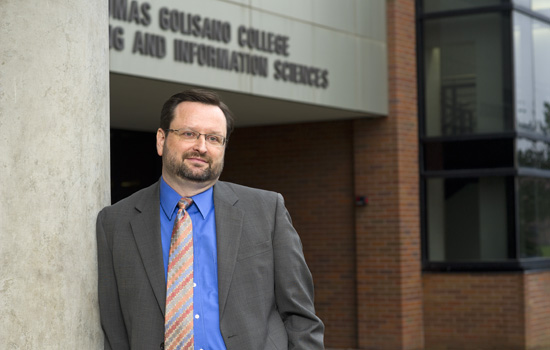Dean Andrew Sears to attend White House Summit
Friday’s invitation-only event will bring together public and private experts to explore solutions for protecting the nation from hacking and data breach threats
Andrew Sears, dean of the B. Thomas Golisano College of Computing and Information Sciences, will attend this week’s White House Summit on Cybersecurity and Consumer Protection.
Andrew Sears, dean of the Rochester Institute of Technology’s B. Thomas Golisano College of Computing and Information Sciences, will attend this week’s White House Summit on Cybersecurity and Consumer Protection.
Sears was invited to attend the summit—set for Friday at Stanford University—at the urging of New York Sen. Charles Schumer who wrote to summit organizers that “RIT has proven to be a leader in preparing students to meet the growing challenges in the field of cybersecurity and would be a key voice at the White House Summit.”
The summit will bring together public and private sector experts to develop ways to better protect American companies from cybersecurity threats. In an era where data breaches and hacking is becoming increasingly widespread, the summit will explore ways to better safeguard consumer financial protection.
In a statement today, Schumer said he “pushed for RIT to be included in this summit because I have seen first-hand the excellent work the university does and the potential it has to shape the conversation. I am confident Dr. Sears will be able to demonstrate on a national stage that universities like RIT are a crucial piece to the puzzle when it comes to ensuring we have professionals with the knowledge and ability to protect our nation’s critical information infrastructure for generations to come.”
Sears thanked Schumer for his efforts on the university’s behalf and said he was appreciative of the opportunity to engage with national leaders in finding solutions to this growing problem. He called it an important recognition of the role that cybersecurity education must play in developing a workforce that is adequately prepared for the tasks ahead.
“RIT has significant expertise in this arena, particularly in the area of computing security education, and our graduates are working at the highest levels in the public and private sectors across a broad range of industries,” Sears said. He pointed to RIT’s recognized leadership in this arena—the National Security Agency and Department of Homeland Security have designated RIT one of its National Centers for Academic Excellence in Information Assurance/Cybersecurity Education and the National Science Foundation recently award RIT $4 million to join the federal CyberCorps® scholarship program.
And he said the university plans to continue its academic leadership role by ramping up training to address the need for trained cybersecurity penetration testing professionals—individuals who can implement, configure and test solutions to ensure their effectiveness in protecting digital assets and averting or mitigating attacks. He said RIT plans to launch a series of penetration testing competitions for colleges this fall, similar to the established National Collegiate Cyber Defense Competition, with the goal of moving toward a set of regional and national gatherings each year. The penetration testing competition would be an initial step toward creating a penetration testing center at RIT that would work with small and medium-size businesses.
RIT was one of the first universities in the nation to establish a department of computing security, which was created in 2012. The university began offering a Master of Science degree in computing security in 2005, and Bachelor of Science degree in 2006. In 2008 and 2009, RIT hosted the first two Northeast Regional Collegiate Cyber Defense Competitions. RIT teams have won five of the seven Northeast regional titles. The RIT team won the national championship in 2013 and finished in second place in 2014.
The RIT Department of Computing Security currently has about 350 graduate and undergraduate students, eight full-time faculty, and six affiliated faculty members from other departments across RIT.














